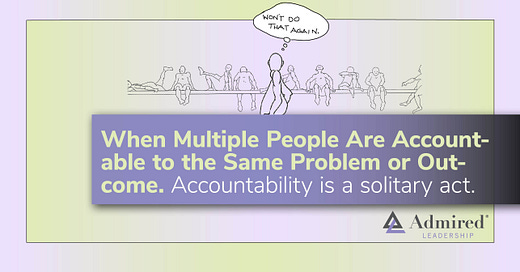To increase the odds of a superior result, some leaders attempt to stack the deck in their favor by holding multiple people accountable to the same outcome.
This sounds like a good idea. Having several people focused on the same prize means someone will likely accomplish the goal, right? Not exactly.
Unfortunately, instead of ensuring success, this tactic actually reduces the odds of a favorable outcome. When multiple parties are accountable, then no one truly is. Multiple parties can never be truly accountable. Only individuals can. In the case of a team, that means the team leader or co-leaders.
By spreading responsibility to multiple people, leaders guarantee no one will feel or act like they own the problem or outcome. In numbers, people find the camouflage and cover to duck full responsibility. Without the autonomy and control to fully own the end result, even the best leaders and team members will give only partial oversight to the issues involved.
Asking a team to be accountable is a common mistake that frequently undermines performance and produces mediocre outcomes. By insisting that a team or group be accountable, no one takes control and owns the end result. Everyone on the team presumes someone else will drive the bus.
When leaders address teams and explain the outcomes they desire, they sometimes don’t even realize they are assigning multiple parties to be accountable. Any time a leader doesn’t specify a particular leader or team member to be accountable to the desired outcome, the presumption is that everyone is being held to that standard. Teams relish such news. They know all too well that when everyone is responsible, they really aren’t.
Accountability is a solitary act. That doesn’t mean multiple parties are not responsible for the actions that lead to the result. But only one person can answer for the outcome. When leaders hold multiple feet to the fire, they soon realize there is no fire.





Very good observations. I found the RACI concept helpful in this context. With RACI you can clearly address and explain who is responsible for what. The acronyms mean:
R = Responsible (for doing something) This can be more than one person; these people actually do the job.
A = Accountable (for the overall thing). This can be only one - and there must be always one person finally accountable.
C = Consulted (about something). That can be many people (asked for their opinion and advice)
I = Informed (about something). Again many people, who just need to be informed.
I’ve been reading this newsletter long enough to know that you aren’t a fan of command and control leadership. But this one sounds a bit like you’re hanging on to this feature of it.